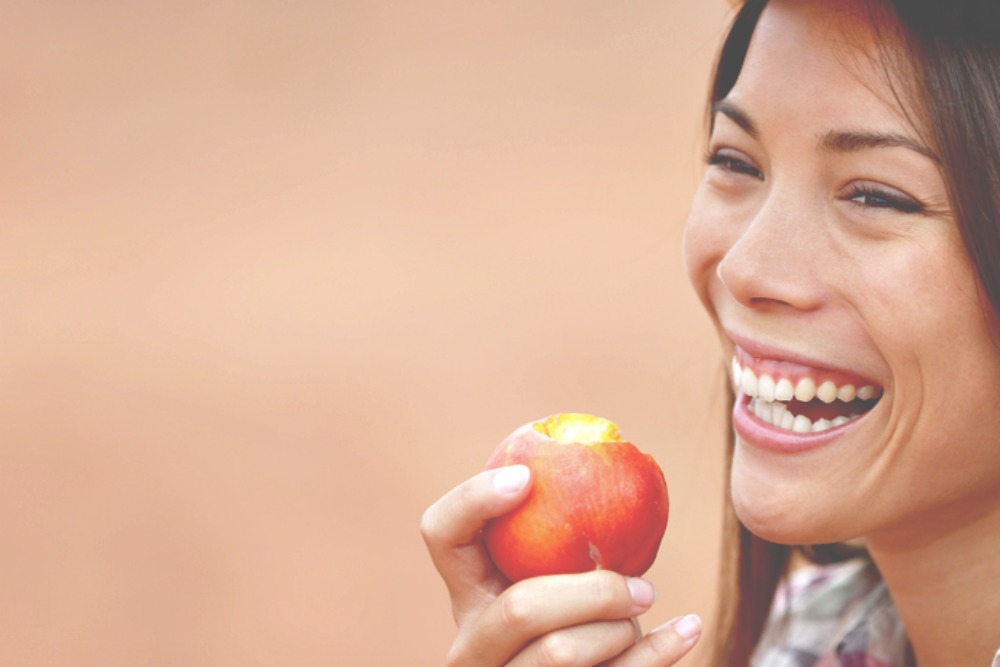The search for happiness is an endless one, and not always an easy one. Now, new research has found that happiness really does grow on trees. Or from the dirt. (Now who would have thought to look there?)
According to researchers, if you want to be happier, look to the fruit and vege patch, or for the more modern-day hunters and gatherers, the fruit and vege aisle. The effect is a substantial one. For each extra serving of fruit and vegetables each day (up to 8 portions) there is an obvious increase in happiness, well-being and life satisfaction.
The effect is so strong, researchers established that people who increase their intake of fruit and veges from none to 8 serves a day, would experience an increase in life satisfaction that is equivalent to moving from unemployment to employed.
The research.
The study, published in the prestigious journal, American Journal of Public Health, was a collaboration between the University of Queensland in Australia and the University of Warwick in England.
It involved more than 12,000 people who kept food diaries and had measurements taken of their psychological well-being. So they could be sure the results were because of the fruit and veges, and not from anything else that could put blips on our human happiness radars, researchers accounted for any changes in income or personal circumstances.
‘Eating fruit and vegetables apparently boosts our happiness far more quickly than it improves human health. People’s motivation to eat healthy food is weakened by the fact that physical-health benefits, such as protecting against cancer, accrue decades later. However, well-being improvements from increased consumption of fruit and vegetables are closer to immediate.’ Professor Andrew Oswald, University of Warwick, England.
These findings are in line with earlier research that tracked 281 people over a three week period. The study found that found that on days when people reported feeling happier, they’d eaten higher levels of fruit and vegetables the day before. Again, 7-8 servings was where the magic happened.
But how does it work?
It’s not yet clear why fruit and veges have such a strong effect on psychological health, but researchers have a few clever ideas.
The first is the possibility that vitamin B12 might have some sort of influence on the production of serotonin, a chemical in the brain that passes messages between nerve cells. Serotonin plays a role in mood.
Another way fruit and veges might work is by doing something special to the microbiata in the gut. We know there is a strong connection between the gut and the brain. When microbiata in the gut are happy, they influence brain chemistry in lovely ways.
Finally, there is some evidence that suggests antioxidants might by the key. Antioxidants are abundant in fruit and veges. A powerful type of these, carotenoids, have been found to be at higher levels in the blood of people who are more optimistic.
So 7-8 serves hey? How much is a serve?
According to government guidelines, a serve of veges is 75g and a serve of fruit is 150g. Here are some examples. Each of these counts as one serve:
- ½ cup of cooked green orange veges (broccoli, spinach, carrots, pumpkin)
- ½ cup cooked dried or canned beans, peas or lentils
- 1 cup green leafy or raw salad veges
- ½ cup sweet corn
- ½ medium potato or other starchy vegetables (sweet potato)
- 1 medium tomato
- 1 medium apple, banana, orange or pear
- 2 small apricots, kiwi fruits or plums
- 1 cup diced or canned fruit (skip the added sugar)
And finally …
More research is needed to understand exactly how fruit and vegetables influence mood. What we do know is that we humans have minds and bodies that weren’t designed to live on processed foods. Thousands of years of evolution hasn’t changed that. Of course, there’s nothing wrong with enjoying something processed sometimes (because it can be delicious!), but what’s important for our minds, bodies and spirits is that we keep the balance.



I’m so happy I “stumbled” across this website! I really did need the extra motivation to do what’s best for me?
E’Leana I’m pleased you found us here too! Hope you can keep finding plenty of what you need here.
I don’t question the merits of eating fruits and vegetables. But for low income/poverty level folks, the cost of those items may surpass their food budgets. Another manifestation of inequity.
I’m so happy that you posted this! (no pun intended 🙂 ).
I absolutely agree and can actually feel it myself that I’m more energetic and upbeat when I had fruit and veggies in abundance for snacks and meals.
And I’d add that drinking plenty of water can really help too. I certainly hope that more and more people try to add fruit and veggies to their diets to reap the benefits.
Thanks Delia! I’ve noticed this myself too – I can so easily slip away from healthy eating especially when I’m busy or stressed (comfort food and I tend to be inseparable some days!) but I notice the difference when I start taking care again. And I absolutely agree with you about water!